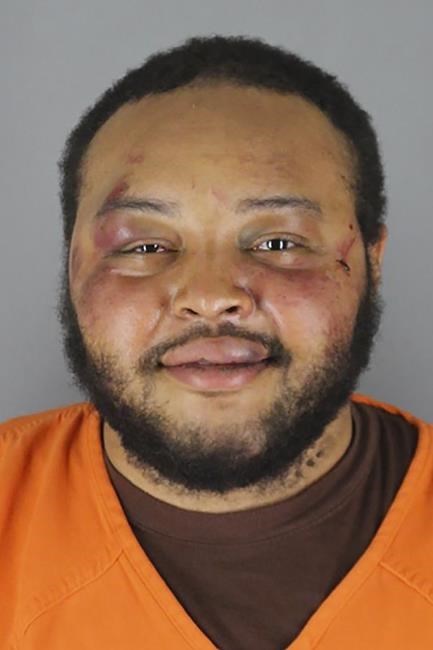
Jaleel Stallings, of St. Paul, Minnesota, is shown in this undated photo provided by the Hennepin County Sheriff's Office. Stallings was arrested in May 2020 during the chaotic protests that followed George Floyd's death last year and charged with attempted murder after firing several shots at a Minneapolis police van. Stallings was acquitted in July on all counts after arguing self-defense, saying the officers were in an unmarked van and had fired at him first. (Hennepin County Sheriff's Office via AP)
September 03, 2021 - 2:04 PM
MINNEAPOLIS (AP) — A man charged with attempted murder after firing at Minneapolis police officers in the chaotic protests that followed George Floyd’s death has been acquitted of all charges against him.
Jaleel Stallings argued self-defense during his July trial, testifying that he fired at the unmarked white van after he was struck in the chest with what turned out to be a nonlethal rubber bullet fired by police.
Stallings, 29, testified that he thought he was being attacked by civilians, had been struck by a bullet and was potentially bleeding out, his attorney, Eric Rice, told The Associated Press on Friday. Court documents show that after Stallings was hit, he fired three shots toward the van as a warning, then took cover. He surrendered when he realized he had fired at police. No officers were hit.
Stallings’ case drew new attention this week when an online digital news outlet, Minnesota Reformer, reported on his acquittal and examined the case in depth. The Reformer published body camera footage of his arrest that shows Minneapolis SWAT officers punching and kicking Stallings as he lay on the ground.
A booking photo of Stallings taken after his arrest shows visible facial injuries. Rice said Stallings testified he had a suspected eye socket fracture, bruising and cuts. Court documents say he also had labored breathing after the arrest, which Rice said was likely due to the impact of the rubber bullet to his chest.
Rice said he’s not aware of any pending investigation or discipline for the officers, but requested such information if it existed and believes it should have been disclosed as part of trial discovery.
When asked if the officers were being investigated or disciplined for use of force, Minneapolis police spokesman John Elder said he can’t release any information because the matter is under internal review.
Stallings is now seeking the court’s permission to allow him to release body camera footage that became public evidence during trial, after a prior order in the case restricted dissemination of videos. A hearing on that issue is scheduled for later this month.
Stallings’ May 30, 2020, arrest made headlines during a time of unrest in Minneapolis, which included the burning of a police station, in the days after Floyd’s death. He was charged with two counts of second-degree attempted murder, multiple counts of assault and other charges. His case got added attention when the Minnesota Freedom Fund, a local nonprofit group, paid $75,000 in cash to get him released on bail.
According to court documents in his case, when Stallings realized he had fired at police officers, he immediately put his gun on the ground and lay face down, with his hands on the ground. A pretrial order from Judge William Koch said Stallings was motionless for 20 seconds and posed no obvious threat before Officer Justin Stetson and Sgt. Andrew Bittell approached him. The order says Stetson began kicking and punching Stallings in the head and neck, and Bittell began kneeing and punching him in the stomach, chest and back.
The judge found that Stetson and Bittell violated Stallings' Fourth Amendment rights during the arrest and that their actions were objectively unreasonable.
“Officer Stetson and Sergeant Bittell allowed their anger and/or fear to overtake their faculties and they beat Mr. Stallings for nearly 30 seconds before attempting to place him in handcuffs,“ Koch wrote. “The video evidence does not support their testimony Mr. Stallings was resisting arrest in any way, instead he surrendered to their authority.”
The new attention on the case comes just months before Minneapolis voters will be asked to weigh in on a ballot question that would eliminate the police department and replace it with a new Department of Public Safety that would use a more comprehensive public health approach.
News from © The Associated Press, 2021